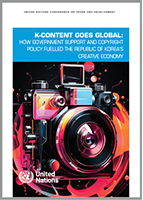
Creative industries are among the world’s most rapidly expanding sectors, offering a viable avenue for economic development, particularly for developing countries.
Creative industries can be defined as “industrial sectors which comprise tangible products and intangible intellectual or artistic services with creative content, economic values and market objectives”.
Content-based industries, a subset of creative industries, encompass various content-producing sectors. The content-based industry comprises the cultural sector, creative and artistic sectors, publishing, music, broadcasting, and film.
There has been a worldwide shift from seeing the cultural sector as associated with public goods that provide primarily non-market values, to seeing the creative industries as an industrial sector in their own right.
This new conceptualisation has also led to a shift in cultural policy: from strategies that focus on subsidising a sector that provides public goods (intrinsic artistic excellence; social cohesion; heritage and identity) to strategies much more related to industrial policy.
New emerging technologies such as artificial intelligence, cloud computing and 3D printing have fundamentally changed some parts of the creative industries, generating new business models in the value chains of producing, distributing, and consuming creative goods and services. For example, online platforms, by using artificial intelligence technologies, provide personalized music or film content to each consumer.
Given the pace of digitalization and the evolving business landscape, new policy challenges inevitably arise for the growth of content-based industry. These challenges include fostering digital competencies; cultivating a conducive environment for creative industries, especially in view of their high-risk nature; and formulating suitable institutional frameworks.
Since the 2000s, the Republic of Korea has championed the development of the content-based industry as a cornerstone for economic growth, following the national agenda to boost high-value activities and high-quality employment in the era of the 4th Industrial Revolution.
This paper delves into the content-based industry of the Republic of Korea with a view to better understanding the factors influencing its success and, in particular, the role of the Government of the Republic of Korea’s policy to support the content-based industry as a new engine of growth for the economy.
The report provides an insider view of the ways in which the Republic of Korea has used a very specific kind of cultural policy to drive the phenomenal creative industries success of the Korean Wave, also referred to as the Hallyu effect.
It reviews debates about the purpose and roles of cultural policy in an international context, and how the creative industries and the digitalization of cultural content have changed these ideas.




